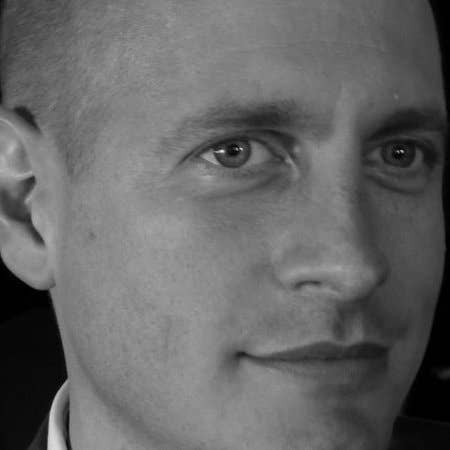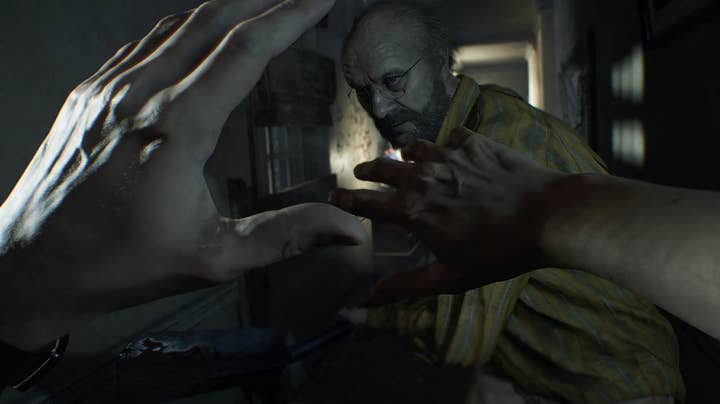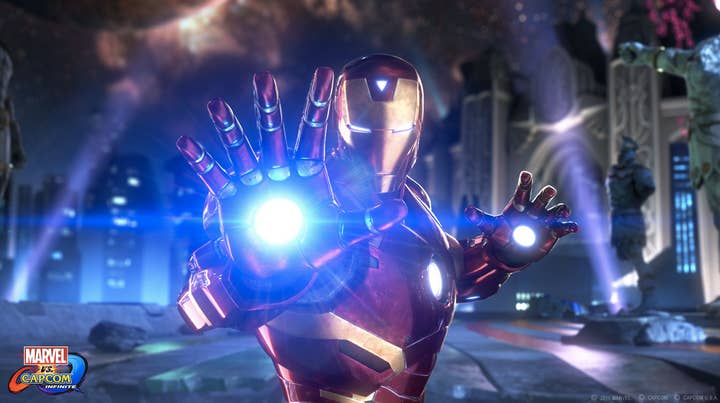East meets West - How Capcom is evolving to meet a global audience
In his first interview as Capcom Europe COO, Stuart Turner talks new development habits, Resident Evil 7 and the future of fighters
What does a hashtag mean to you?
Depending on where you live in the world, it can mean something quite different. To me, it's a social media tool designed to tag certain posts. That's also what a hashtag means to Stuart Turner, Capcom Europe's newly appointed COO. So you can perhaps understand why he was a little surprised to see the symbol appear above the head of a character in one of his firm's games.
"It's the anime symbol for being angry," he explains to GamesIndustry.biz in his first interview in the role. "This symbol is the equivalent of seeing steam coming from ears in a Tom and Jerry cartoon. But how many people playing the game outside of Japan understand the character is angry? Something as simple as a gameplay feedback loop isn't understood by everyone in our region. It might sound a minor point but it's a possible barrier to enjoyment."

He continues: "Creators consciously or subconsciously draw inspiration from around them whether that be political situations affecting them or other entertainment. But living in Japan, high-end TV drama isn't the norm and music and games are dominated by Japanese creations. At the cinema, anime is all encompassing, so you can understand why ideas don't always seamlessly transfer across to the EMEA region. Japanese anime permeates everything, and certain anime tropes are accepted as the norm within Japanese culture and make their way into the games."
Turner has been at Capcom for more than ten years, having started his career at Sega and then spending over five years at PlayStation - so he's certainly spent plenty of time working within Japanese organisations. Yet Capcom is arguably more Japanese orientated than most, with the majority of its games being created within the region. Therefore, although the publisher has a strong stable of legacy brands, keeping them relevant to a Western audience - and not just old school fans - is clearly a challenge. Yet it's one Turner is keen to help remedy.
"Where we've had our best success in recent years is blending classic Japanese game design with a more Western aesthetic," he says. "It's about very much continuing this with future products. We're always going to have our Japanese curiosity titles that appeal to a core fanbase, but to grow our market share we need to break down barriers so our games can appeal to as many people as possible, from our old school fanbase of people in their 30s and 40s, to those in their early years just starting out in gaming.
"In Japan, a gameplay mechanic is often devised first and story is built around this. By contrast Resident Evil 7 was created where a story was written first and the game designed around it"
"In order to make this a reality we have to work much closer with our colleagues in the R&D department. I sat down with one of our Osaka-based game directors a few months ago and we discussed at length the game development process. In Japan, a gameplay mechanic is often devised first and a story and characters are built around this. By contrast, with Resident Evil 7 a story was written first and the game designed around it, while Capcom Vancouver studios have four in-house scriptwriters who write the story first. That's a huge difference to the way games are developed. That's not to say a perfect game mechanic can't be a beautiful thing and a selling point in its own right, but to appeal to a wide audience as possible you need to have fully fleshed out characters, a plot and a story with some, however small, anchor in reality.
"I want to stress, that this is certainly not corporate suits getting involved in development, telling R&D development how to make a game or using a load of focus groups to design a title - '16.4% more gamey please'. We let the creators create. What we're trying to do is advise colleagues on European gamers, and how they might make their games more accessible. Whether that's an exchange program between in-house studios or a more global synced-up exchange of information. It's almost like an extra level of localisation, beyond just language. Except we do this in advance of games being developed."
What this doesn't mean, necessarily, is more Western development. The publisher has worked alongside a number of European and US studios in recent years, but the results haven't always been successful.
"We did outsource and invest with mixed results, it's always tricky handing over the keys to an outside party and then expecting them to 'get' the Capcom DNA or understand the depth of feeling for one of our decades-old franchises," acknowledges Turner. "Some developers such as the Ninja Theory and Dontnod guys nailed it, others perhaps struggled a lot more with the expectations.
"We are, however, still heavily investing in Western development, but this investment is very much focused on our own Capcom Vancouver Studio under the guidance of Joe Nickolls. There we obviously have a top class studio that understands Capcom, has access to a huge knowledge base, an understanding of the wider companies DNA and increasing influence within the entire R&D group.
"We may still outsource some smaller porting projects but for now we're confident in our in-house teams to deliver fantastic products."
Turner is probably right to have faith in the internal development teams considering the response to its most recent title. Resident Evil 7 wasn't just a return to form for the franchise, it was a return to form for Capcom after a few recent misfires. The title got the balance right between traditional Resident Evil gameplay and the need to evolve the formula, while the PR and marketing campaign was effective - helped in no small part by the success of the demo that was released at last year's E3.

"We couldn't rely on good will alone - as we'd used much of this up [with recent disappointing Resident Evil games] - and a flashy trailer wasn't going to cut it on its own either," Turner admits "It was decided that a demo available at announcement was a must, that people needed to not only be wowed by the announcement but get exactly the same hands on experience wherever they were in the world. Then PT was unveiled at Gamescom 2014 and a collective 'head desk' noise was heard.
"When the demo landed at E3 last year we were delighted with its reception, the huge chatter about the dummy finger, and all the secret nods to previous games filled up message boards and social media. I think the PR team spent half its time answering calls and emails from stuck journalists. While it was always in our plans to expand upon the demo, the feedback took us all by surprise, so in discussions with global offices and R&D it was decided that we should cancel the more traditional demos we'd planned and increase our focus on the current demo.
"The demo was definitely the right idea and of course it would never have happened if the development team were not open-minded and flexible. The marketing campaign was short and light on content deliberately, it possibly had an effect on pre-order numbers, but definitely added to that buzz around launch window as everything was new for everyone."
The big aim for Capcom now is to keep Resident Evil 7 selling. The upcoming free DLC will help, but it's the VR element that Turner feels might extend the life of the horror game - it's potentially the perfect game to get alongside a PSVR.
"One thing that has surprised everyone both at Capcom and at Sony is the amount of hours being put in by people using PSVR with Resident Evil 7"
"One thing that has surprised everyone both at Capcom and at Sony is the amount of hours being put in by people using PSVR," he says. "The attach rate is huge. Given that the game is terrifying on a TV, I'm impressed by anyone that can play it through in VR. It's certainly led to extending drop off of the title as a must have for PSVR owners."
The successful launch of Resident Evil 7 contrasts somewhat with last year's Street Fighter V. The fighting game's release and build-up was beset by online issues and controversy around the lack of content. It wasn't Capcom's finest hour.

"I still believe the service game model is absolutely the thing for Street Fighter," Turner says. "It was always going to be a huge challenge to take a well loved brand from a traditional boxed product to a service game business model. The way a game like that is produced, developed, tested and marketed are all hugely different to a traditional boxed game. I don't think it would be wrong to say that we didn't get much right with Street Fighter V at launch, we've learnt and put things in place that will avoid such issues ever arising in the future. Getting an offering that's right for consumers first should be always be our priority.
"However, Street Fighter V is hitting its stride, there are seasons of content to come and we still have support plans for the title for many more years. Our Capcom Pro Tour is going into even more countries than ever before while local tournaments are being set up in places such as India in 2017. After a difficult start Street Fighter V in a very good place now."
Despite some recent poor performances in the genre, Capcom appear committed to fighting games. At the end of last year, the firm announced it had renewed its licensing agreement with Disney for the Marvel IP and is currently working on Marvel vs Capcom Infinite.
"I still believe the service game model is absolutely the thing for Street Fighter"
"Fighting as a genre is an interesting one," acknowledges Turner. "It's an area that we as a company excel in, but it's always one that we need to take more of a lead on for the success and health of the whole genre.
"The history of the genre means that its fanbase skews slightly older than other types of games. So the challenge for us, and any other publisher, is always to bring new people into fighting games. It's why we've done things with Namco in the past - as long as the genre remains healthy, that's the most important thing regardless of whether people are playing Street Fighter, Tekken, Mortal Kombat, Injustice or one of the other titles.
"The added exposure that eSports now brings will hopefully see growth for the fighting genre over the coming years. Fighting games as a spectator event has huge potential, the games are short, it's simple to grasp, the competitors are highly skilled personalities and tournament upsets aren't unusual. It's why we've had broadcasters picking up tournaments both for traditional TV transmission and online streaming across the globe.
"Marvel vs Capcom fits into this as a great introduction to the genre as a whole, far more simplistic and technically easier to pick up and play, and obviously having some of the best known characters on the planet from the Marvel Universe has huge appeal especially to that younger new audience we're keen to bring in."
Capcom Europe today seems like an entity that's building itself around fighting games and horror titles - whether's that Marvel, Street Fighter, Resident Evil or Dead Rising. In Japan, there's Monster Hunter (which is gradually growing in the West). And, of course, there's a number of brands that remain sealed in the Capcom vault that might find their way out at any moment.
Yet what about the next chapter? There's been moments in the history of Capcom where new IP sat at the heart of its vision. Perhaps most notably when the firm revealed the Capcom Five on GameCube, which featured four new IP in the form of PN03, Viewtiful Joe, the cancelled Dead Pheonix and Killer 7 (the fifth was Resident Evil 4). There has also been Okami, Lost Planet, Zack and Wiki, Remember Me and Dragon's Dogma, too. Sure, many of these games didn't last beyond the first release, but the mere existence of these titles showed a company that was eager to uncover its next super franchise. With the exception of the eternally AWOL Deep Down, Capcom's new IP slate is decidedly bare.
"Game development is an expensive business," concludes Turner. "When you have 30-plus years of history and several hundred brands the safer option is sometimes to go back to what you know, the danger obviously is you can become too insular So it's important that we keep an open mind to everything whether that is a re-imagining, a reboot or a new IP. A good game is a good game regardless and we'd certainly be open to new IP from our internal studios if it fitted within our portfolio."
